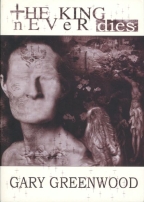The King Never Dies
Gary Greenwood
Razorblade Press
UK Trade Paperback
ISBN 0-9531468-9-8
Publication Date: 2001
184 pages; $15.99
Date Reviewed: 08-03-2001
Reviewed by Rick Kleffel © 2002

REFERENCES
COLUMNS
|
|
|
The King Never DiesGary GreenwoodRazorblade PressUK Trade PaperbackISBN 0-9531468-9-8Publication Date: 2001184 pages; $15.99Date Reviewed: 08-03-2001Reviewed by Rick Kleffel © 2002 |
|
|
REFERENCES |
COLUMNS |
Religion has always been a fertile ground for horror writers, especially Christianity. From the crosses that repulsed Dracula to the cross abused in The Exorcist, the Christian religion has shown itself to be an excellent birthplace for great horror. What's most interesting is how many takes on the Christianity there, how much room for imagination and invention it allows. Razorblade Press, a fantastic new publisher from Wales, have given us Gary Greenwood, whose first novella, The Dreaming Pool, showed some real elan. In The King Never Dies, Greenwood uses an imaginative riff on the Christian religion to show off his superb writing skills, and gives the reader in 184 pages more fun than can be had in most brick-size blockbusters.
The King Never Dies uses a science fictional writing device with a nice Christian horror twist. Set in the near future, the novel starts with our familiar landscape altered by a sudden catastrophic event -- the arrival of the Godhead on earth. Following this, two types of beings start appearing, apparently out of nowhere -- Uppers and Downers. Uppers are alabaster-skinned apparent ex-angels, while Downers are crusty burnt-skinned beings of great strength who appear to be the hellish counterpart of the Uppers. Neither are very nice, and both are after Aitch, who has been sent on a mission to penetrate the heart of London with something for the Godhead.
As with much SF, the reader -- and the characters -- are concerned with how the world got the way it currently is and what precisely is the origin of the Uppers, the Downers and the Godhead. England, where the Godhead chose to put in its first appearance, is currently under the rule of the RAF -- the Religious Armed Forces. It's a fundamentalist Christian state, patrolled by vicious thugs who are helped by Uppers and occasionally thwarted by Downers. But nobody knows the agenda of either faction, and Aitch has to run a gauntlet to the heart of the mystery, the Godhead itself.
Greenwood carries off this complex world in a few brief and effective scenes and demonstrates his writing skills with incredibly effective scenes of action, that run off in the reader's mind like a movie. He manages to keep the suspense taut on two levels -- a theological level, trying to determine why the Godhead, the Uppers and the Downers are here, and a purely practical level, as Aitch makes his way towards the Godhead. He gives us a parody of England today, with lowlife thugs who are actually devils and well meaning government servants who have angelic powers and a cloudy agenda that may not be well intentioned towards man, God, or country.
The King Never Dies manages the neat trick of keeping up the tension, the terror and introspective theology simultaneously. Given the brief length it also cries out to be made into a movie, if it weren't already playing on the reader's inner big screen. Greenwood is clearly on his way to the big time. Whether your interest is in action-oriented horror, science fictional speculation or religious and social parody, you'll find plenty of rewards in 'The King Never Dies'.